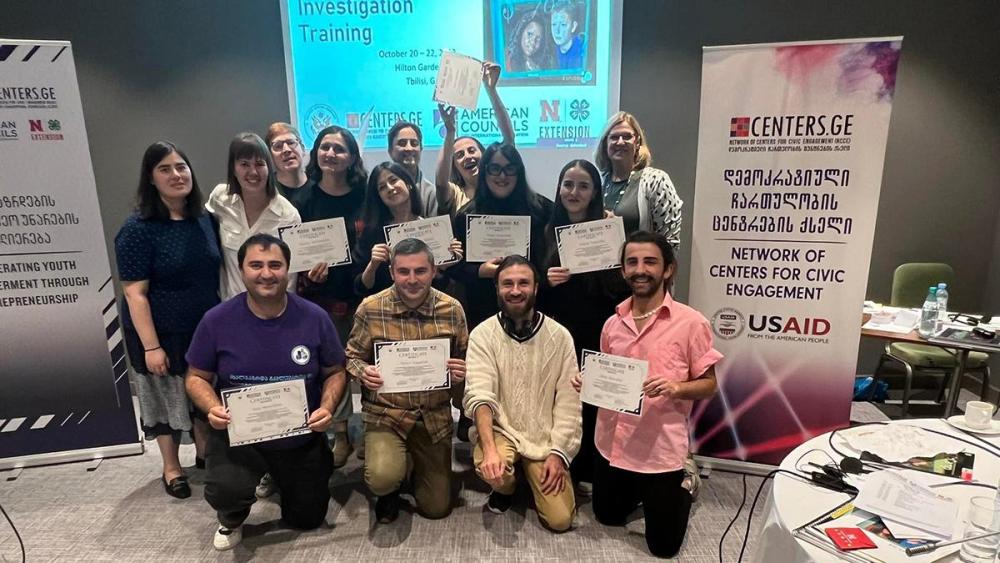
In a unique initiative by the American Councils for International Education, Nebraska Extension educators Molly Brandt and Marilyn Schlake were invited to travel to the countries of Georgia and Armenia in 2022 to train local educators in the principles of the 4-H Entrepreneurship Investigation (ESI) curriculum.
The American Councils for International Education, established in 1974, is a not-for-profit organization dedicated to fostering education, research and mutual understanding between the United States and countries in Eastern Europe, Eurasia, and Southeast Europe. The Council reached out to Brandt and Schlake through Dagen Valentine, a former Nebraskan who now serves as the Country Director for the American Councils in Armenia. Valentine’s experience with the ESI curriculum was the driving force behind this ambitious project in the South Caucasus region.
Brandt, an innovation and entrepreneurship 4-H educator, and Schlake, a Rural Prosperity Nebraska educator in the Department of Agricultural Economics, prepared for what they thought was a one-time experience. However, after their successful endeavor in Tbilisi, Georgia, in October 2022, they were invited back in April 2023, to deliver similar training in Yerevan, Armenia.
The first challenge in this educational journey was to translate the curricula into the local languages and to adapt financial statements from dollars into the Georgian Lari and the Armenian Dram. While Georgia's Lari was roughly one-third of the American dollar, the Armenian Dram’s exchange rate was approximately 400-to-1, requiring calculations in much larger numbers to maintain financial accuracy.
“The primary goal of the training was to showcase how experiential learning can be incorporated into teaching methodologies,” Brand said. “In both countries, much of the school curriculum is traditionally taught through memory and lectures, so we aimed to enhance this by adding practical learning exercises.”
The training sessions encompassed a range of activities, from encouraging adults to think like 12-year-olds and devise a business concept, to developing a business pitch, analyzing inputs, calculating the cost of goods sold, and role-playing good and poor customer service scenarios. These sessions took place over three days, with interpretation services provided as needed.
Brandt and Schlake were heartened by the positive response to the training sessions.
“Their eagerness to learn, their confidence and their readiness to share their new knowledge with their students were rewarding outcomes,” Schlake said.
Their joy was magnified when they saw pictures of the students' success posted on Facebook, showcasing their developed products and business ideas.
The supportive environment in Armenia was noteworthy, especially the involvement of Davit Sahakyan, the Deputy Minister of High Tech Industry. Sahakyan extended his full support for the initiative and offered his office’s resources to assist students who excelled in technology. This commitment echoed Schlake and Brandt's objective of fostering an entrepreneurial mindset from a young age.
Cultural immersion added another dimension to their trips. In Georgia, they were treated to a traditional Supra — or feast — every night, complete with a toastmaster, known as a Tamada, who led a series of toasts through the meal. They also witnessed traditional dance performances from various Georgian regions. In Armenia, they participated in a communal gathering at the Cascades park area with an Armenian dance troupe and enjoyed traditional Armenian cuisine at a local restaurant.
Brandt and Schlake were deeply touched by the resilience of the Georgian and Armenian people, whose societies have endured significant political struggles and economic hardships. Despite these challenges, their pride in their heritage and culture remained strong.
They noted the stark cultural differences between the neighboring countries, which defied their initial assumption of similarity due to geographical proximity. This observation prompted them to reflect on the distinctiveness of individual communities back in Nebraska, regardless of their apparent homogeneity.
“When you think about it, rural communities in our state each have their own distinct culture and history, so we can really use this experience to embrace those differences as we work with them to move forward with new opportunities,” Schlake said.
In terms of education, Brandt and Schlake found the eagerness to learn and the receptiveness of the Armenian and Georgian educators heartwarming and encouraging.
“These educators' commitment to take the curriculum back to their classrooms, to invest in their students and to plant the seeds of entrepreneurship in their young minds, were inspiring success stories that emerged from this project,” Brandt said.
The visit also highlighted the importance of experiential learning and the need to shift away from traditional rote learning. The experience emphasized that learning can be more impactful when it involves hands-on activities, critical thinking, and personal experiences.
Brandt and Schlake both said their journeys to Georgia and Armenia serve as examples of how cross-cultural educational initiatives can inspire, transform, and nurture a generation of learners. By fostering an entrepreneurial mindset and supporting experiential learning, they have contributed to paving the way for a vibrant and enterprising future for these nations.